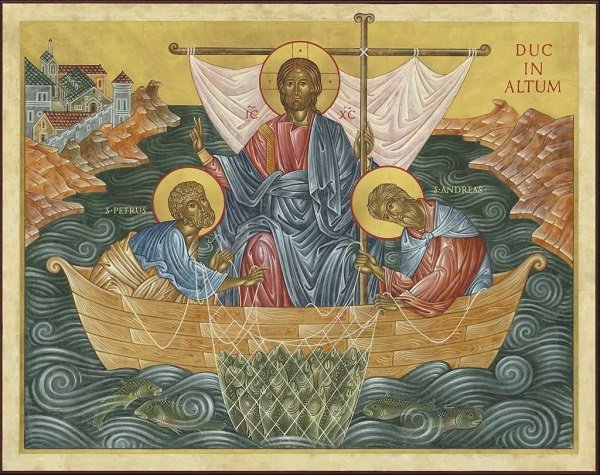“Let the children be fed first, for it is not right to take the children’s bread and throw it to the dogs.”
—Mark 7:27
At first glance, these words of Jesus seem unsettling. The gentle Rabbi, the Good Shepherd, the One who heals the broken-hearted, here appears uncharacteristically harsh—dismissing a desperate woman with what sounds like an insult. Why would He say such a thing? Why does He not immediately grant her request?
Yet, as with all of Christ’s words and actions, there is far more at work beneath the surface. This moment is no accident. It unfolds according to divine providence, revealing a profound lesson about faith, humility, and perseverance.
To truly grasp its significance, we must place this encounter in its proper setting—within Mark’s Gospel, within salvation history, and within the great unfolding of God’s plan for Jew and Gentile alike.
The Setting: A Desperate Plea in a Foreign Land
Jesus has withdrawn to the region of Tyre, a Gentile territory far from the religious heartland of Israel. His ministry has already seen opposition from the Pharisees and teachers of the Law, who fixate on external purity while remaining blind to their own hardness of heart. Shortly before this encounter, Jesus rebukes them, saying:
“This people honours me with their lips, but their heart is far from me.” (Mark 7:6)
He then makes a radical declaration: it is not what enters a person that defiles them, but what comes from within. In other words, purity before God is not about ritual observance but about the state of the heart.
And now, in the very next episode, we see a living contrast: a Gentile woman, considered “unclean” by Jewish standards, who comes before Christ—not with legalistic pride, but with raw, unshaken faith.
The Test: A Seemingly Harsh Reply
The woman is Syrophoenician, a pagan by birth, yet she has heard of Jesus and believes in His power. She falls at His feet and begs Him to drive a demon from her daughter.
But instead of immediate compassion, Jesus replies:
“Let the children be fed first, for it is not right to take the children’s bread and throw it to the dogs.”
It is a striking response. The “children” clearly refer to Israel—the chosen people to whom God’s promises were first given. The “bread” represents the grace and healing Jesus has come to offer. And the “dogs” … the term stings.
Yet, a closer look at the Greek text softens the edge. Jesus does not use the common word for stray, unclean dogs (kyōn), but rather kynarion—meaning little dogs, household pets. This is not a slur, but a metaphor. He is speaking in parable, testing the woman’s understanding and resolve.
Will she take offence and turn away? Or will she persist, trusting in the mercy of the One before her?
The Response: Faith That Will Not Be Denied
The woman’s reply is nothing short of remarkable.
“Yes, Lord; yet even the dogs under the table eat the children’s crumbs.”
There is no indignation, no protest. She accepts the order of salvation—first to Israel, then to the nations—but she also knows something deeper. She knows that the mercy of God is so abundant that even the smallest portion is enough to satisfy.
She does not demand or presume. She pleads, but with faith. And in that moment, Jesus’ purpose is revealed—not to reject her, but to draw out her faith, to make it shine as an example for all who would follow.
“For this saying, you may go your way; the demon has left your daughter.”
A Deliberate Lesson in Faith
It is crucial to recognise that Jesus knew what would happen from the start. His words were not meant to drive her away, but to lead her to a deeper faith, to make her an enduring witness to humility and perseverance.
This is a pattern we see elsewhere in Scripture. When Jesus meets the Samaritan woman at the well, He first challenges her before revealing Himself as the Messiah (John 4). When He delays healing Lazarus, it is not out of neglect but so that a greater glory may be revealed (John 11).
The same is true here. The Syrophoenician woman stands in stark contrast to the Pharisees just before her—they claimed to be righteous but lacked faith, while she was considered an outsider yet possessed unwavering trust.
The Foreshadowing: The Bread for the Nations
The significance of this encounter does not end with the woman’s daughter being healed. It is a turning point in the Gospel narrative. Immediately after this event, Jesus moves into another Gentile region, where He heals a deaf man (Mark 7:31-37) and then miraculously feeds four thousand people (Mark 8:1-10).
If the feeding of the five thousand symbolised God’s provision for Israel (with twelve baskets left over, reminiscent of the twelve tribes), then the feeding of the four thousand among Gentiles is a clear sign:
The Bread of Life is not for Israel alone. It is for all nations.
The woman’s plea—”even the crumbs are enough”—is answered in full. Not mere crumbs, but an abundance of bread is given. Christ has come first to Israel, but through them, His grace will extend to the ends of the earth.
What This Teaches Us Today
The encounter with the Syrophoenician woman is more than a historical moment. It is a personal invitation to reflect on our own faith.
- Do we persist in faith, even when God seems silent?
– The woman did not turn away at the first difficulty. How often do we give up too soon in our prayers? - Do we approach Christ with humility?
– She did not demand, but trusted in His mercy. Are we willing to submit to God’s timing and will, or do we approach Him with entitlement? - Do we recognise the abundance of God’s grace?
– The woman knew that even the smallest portion of God’s goodness was enough. Do we live with that same trust, or do we constantly fear that God’s love is limited?
The Invitation to All
Ultimately, this passage reveals the heart of Christ: not one of exclusion, but of invitation. The Syrophoenician woman’s faith foreshadows the great inclusion of the Gentiles into the Church, where Jew and Greek, slave and free, man and woman are all one in Christ Jesus (Galatians 3:28).
Like her, we must come to Christ with faith that does not waver, with humility that does not resist correction, and with perseverance that refuses to let go. And when we do, we will find that He is always ready to respond—not with crumbs, but with the fullness of the Bread of Life.
So, what does this passage say to you? Have you ever felt as though God was testing your faith before answering your prayer?



